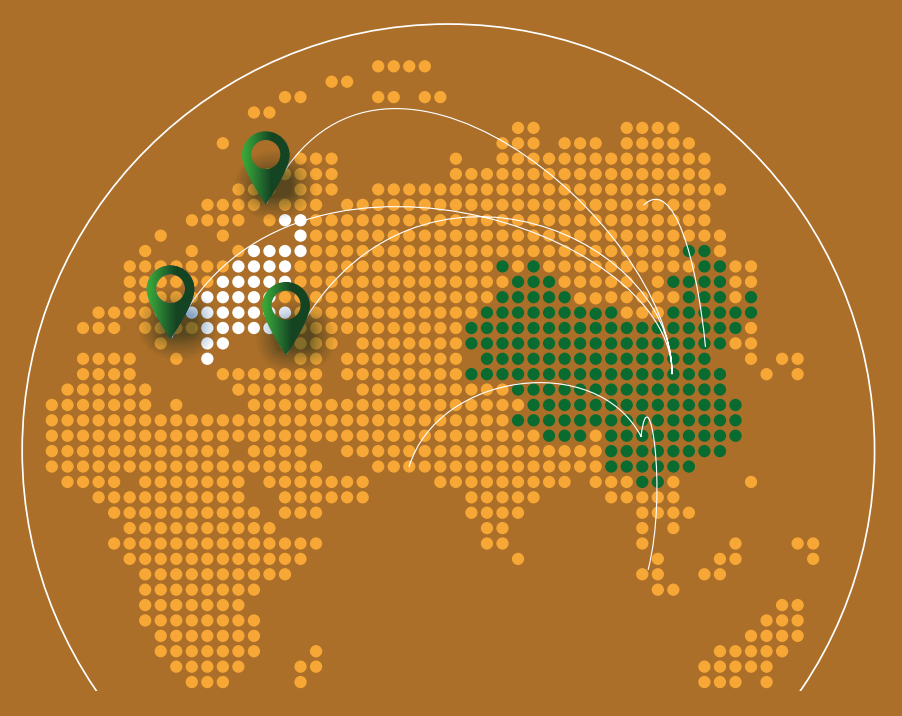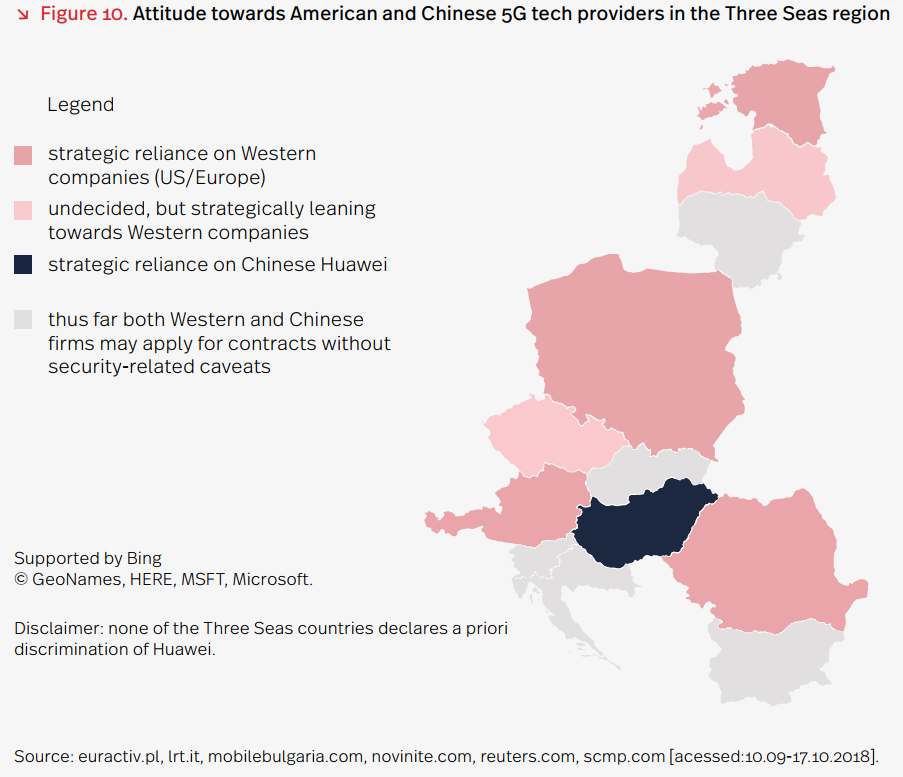Three Seas as a region of contention between China and the United States

Published: 17/06/2020
The rivalry between the United States and China is a battle of two global systems: the Bretton Woods monetary system and China’s New Silk Road initiative, the germ of a parallel system.
The coronavirus pandemic has accelerated changes in the two systems and increased friction between them. Both players – the USA and China – attach particular importance to the Three Seas region, i.e. the belt of 12 European countries: from Estonia to Poland to Bulgaria. The Three Seas region and the European Union will have to face the rivalry of the two global players using the so-called sticky power. And today’s struggle is not only for influence over financial and monetary systems or the civilisational identity – the West versus Confucian values – but also for the control of 5G infrastructure and the international image in the context of responsibility for the pandemic outbreak – as follows from the report of the Polish Economic Institute entitled ‘Belt and Road meets Three Seas. Chinese and American sticky power in the context of Polish security and other strategic interests’.
According to estimates based on the State Power Index of the Institute In.europa, in many respects China and other Confucian countries have already outpaced Europe, the USA and other Western economies, which will be reflected in the ethics of scientific research and public policies, resulting the evolution of global political systems. The rise of China as a non-democratic, Confucian power has already alarmed the United States, perceiving the country as a strategic rival.
China has been introducing innovative solutions in areas such as artificial intelligence or global Internet infrastructure, acquiring significant influence over the digital transition of world economies. Even before the taking of office by President Donald Trump, the United States promoted the development of global economic areas, e.g. through the Bretton Woods system. Solutions applied by China and by the USA differ widely, which may lead to ethical disputes. From the point of view of the Western countries, initiatives such as that intended to reactivate the Silk Road – Belt and Road – may be seen as corruptive and resulting in dependence on the Chinese economy. The total cost of the project is estimated at USD 4 to 8 trillion and cooperation agreements with China have already been signed by as many as 125 countries, explains Piotr Arak, the Director of the Polish Economic Institute.
The attention of both powers is drawn to the European Three Seas region: 12 Central and Eastern European countries having suffered the effects of years of communism and still, to a certain degree, lagging behind in terms of technology and infrastructure. Thus their significant investment potential that attracts interest from both China and the USA. The former sees the region as the gateway to Europe for its Belt and Road, whereas the latter – as a barrier to Russia’s or China’s political actions.
The two powers attach particular importance to digital security, the area to have already contributed to the trade war escalation as both China and the USA are aware of the crucial role to be played by 5G in the new political and economic structures. Therefore, both powers strive to influence decisions taken by the Three Seas countries with regard to cooperation in this field.
Poland and Romania give priority to partnerships with European and US firms, whereas Hungary prefers Chinese corporations. In contrast, Bulgaria seems to show no strategic preference to either of them. For historical reasons, Poland places its investment-related hopes on the West. At the same time, Poland is also interested in cooperation with China, as reflected in undertakings such as the planned construction of the Solidarity Transport Hub. This project also involves measures such as building 1,600 km of new railway lines, says Piotr Arak.
How will the coronavirus affect globalisation?
Due to the crisis following the SARS-CoV-2 coronavirus pandemic, there is a growing sentiment that the Western economies should be ‘decoupled’ from China and production processes should be ‘reshored’ from China back to the West. The PEI analysts have already pointed out that reshoring began several years ago and primarily concerned the relocation of production from China to India and South-East Asian countries, but in connection with the trade war between the United States and China – to the USA as well.
As explained by Grzegorz Lewicki, the author of the report and a fellow of the Polish Economic Institute, nowadays the processes seem indispensable for security reasons. Let us note that in March 2020 – when Poland’s demand for disinfectants skyrocketed – the key ingredients necessary as production inputs were nowhere to be found, which disrupted the production chains of Polish firms and prevented them from supplying the final product. It was due to the fact that German and Dutch manufacturers had put the key ingredients on their respective local markets to support their citizens in the first place, says Grzegorz Lewicki.
Therefore, in a longer term, we can expect the globalisation patterns to differ even more widely, as a result of temporary global slow-downs and accelerations, affecting individual countries to a varying degree. The core of such ‘patchy’ globalisation will be security, explains Grzegorz Lewicki. After extreme experiences relating to the pandemic, countries will start to establish experimental institutions allowing to temporarily reduce civilisational complexity in case of crisis. Their objective will be to efficiently and safely limit certain activities – air transport, migration, foreign production, etc. – should such a need arise, e.g. in the case of a pandemic.
On 17th June, the report was discussed with leading experts from all over the world. The full debate can be watched at our YouTube channel: https://www.youtube.com/channel/UC-pj4cTAI-5TO1grfYjsvdQ
Here we present general insights of the panelists on the issue:
Tony van der Togt, Clingendael Institute (Netherlands)
For the short term, Russia represents the more serious threat to the European stability and security than China, especially in a military dimension. The EU should go towards becoming a geopolitical player and establishing the reciprocal relations with China in terms of market access. Many countries are realising that Belt and Road goes not only with profits, but is also an element of Chinese strategic interests and expansion. In Europe we want to diminish economic dependencies on China, so for instance in digital sphere we should support the European attempts to build a strong and independent industry.
Ian Brzeziński, Atlantic Council (USA)
China in some ways is more significant challenge for the West than Soviet Union was during the Cold War. Everyday we face the Chinese misinformation and violation of the rules-based system. It should be noted that The Three Seas Initiative has added a real value to the Trans-Atlantic community by enhancing the economic resilience of Europe. The Three Seas Initiative should get a clear support from US and EU. This would enable Europe to evolve as a more common and prosperous place. 5G is an important technological driver and should be seen as priority for Europe.
Alicia Garcia-Herrero, Bruegel Institute
China’s aspirations are global, so the division between West and China is not only civilizational, but clearly political. However, China has mighty economic power, but not sticky power. Negating the multilateral mechanisms reduces the power of China as they prefer to negotiate everything bilaterally. Metaphorically, their approach to the globalisation evokes the one of Roman empire. It is not the most effective way, but China will not be able to translate its economic power into military and political power without trust which is absent in their institutional system.
Lazar Comanescu, the New Strategy Center (Romania)
The Three Seas Initiative may be perceived inappropriately as a disturbing to a cohesion of the EU. In fact, it contributed to strengthening of Europe. We have to be pragmatic with reference to the values. Modernisation which is enabled by the Three Seas Initiative should align with security.
Benjamin Haddad, the Atlantic Council
The united EU would be much stronger and would be able to play a truly global role. There is no bilateral avenue for the US in relations with China. It has to accompanied by the US-UE partnership which is an important vehicle of future prosperity and safety. For the Three Seas Initiative it is a time to deliver on concrete projects. Reintegrating of supply chains in a post-pandemic world will produce a great window of opportunity for the Three Seas Initiative.
The Polish Economic Institute is a public economic think-tank dating back to 1928. Its research spans trade, macroeconomics, energy and the digital economy, with strategic analysis on key areas of social and public life in Poland. The Institute provides analysis and expertise for the implementation of the Strategy for Responsible Development and helps popularise Polish economic and social research in the country and abroad.
Media contact:
Agata Kołodziej
Head of the communications team
T: 48 727 427 918
Kategoria: Other / Press releases / Report / Reports 2020






